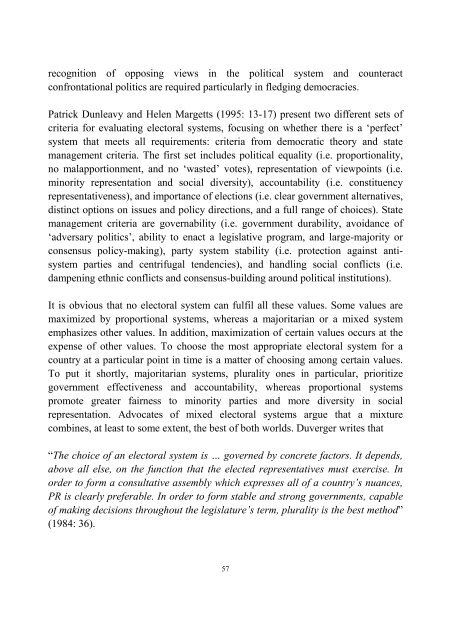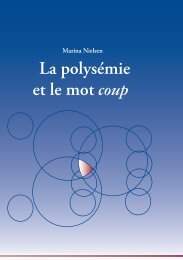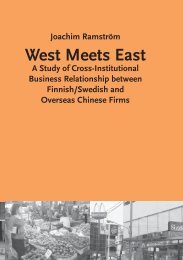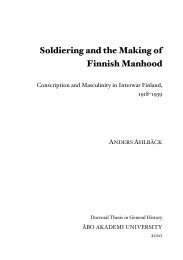- Page 1 and 2:
Krister LundellContextual Determina
- Page 3:
CONTEXTUAL DETERMINANTS OF ELECTORA
- Page 6 and 7:
CIP Cataloguing in PublicationLunde
- Page 8 and 9:
at Åbo Akademi University, the Fac
- Page 10 and 11:
3.2 Explanations of Electoral Syste
- Page 12 and 13:
9. CONCLUSION 2239.1 The Rational P
- Page 14 and 15:
politics. Both approaches bear rele
- Page 16 and 17:
electoral system choice as an epoch
- Page 18 and 19: 1.2 The Importance of Electoral Sys
- Page 20 and 21: Within the range of democratic inst
- Page 22 and 23: will depend on the specific cleavag
- Page 24 and 25: Before describing different voting
- Page 26 and 27: 2.1.1 Ballot StructureThe ballot st
- Page 28 and 29: formula, and the variety of elector
- Page 30 and 31: ather be regarded as a characterist
- Page 32 and 33: 2.2.1 Plurality Systems2.2.1.1 Sing
- Page 34 and 35: mixture of BV and PBV. In my classi
- Page 36 and 37: Weaver 1984: 198-199). CV implies t
- Page 38 and 39: total election, often pull out of t
- Page 40 and 41: disadvantage is that it presupposes
- Page 42 and 43: parties and minority groups. Furthe
- Page 44 and 45: simultaneously avoiding disproporti
- Page 46 and 47: and Blais. They also agree that the
- Page 48 and 49: Whether one formula applies or not
- Page 50 and 51: difficult. Even an independent comb
- Page 52 and 53: attention to all three main dimensi
- Page 54 and 55: (national, regional and local lists
- Page 56 and 57: The degree of proportionality also
- Page 58 and 59: variables: ethnic and cultural dive
- Page 61 and 62: smallest category, representing 15
- Page 63 and 64: democracies. 12 Nevertheless, the g
- Page 65 and 66: (Vanuatu) are represented by merely
- Page 67: 3. THEORETICAL FRAMEWORKIn this cha
- Page 71 and 72: systems. If we reformulate the ques
- Page 73 and 74: the rules, the lack of knowledge is
- Page 75 and 76: not. Consequently, their analysis c
- Page 77 and 78: proportional electoral systems. He
- Page 79 and 80: groups as possible, to avoid attemp
- Page 81 and 82: associated with certain features an
- Page 83 and 84: also called electoral engineering.
- Page 85 and 86: (2002: 14). Public opinion, often e
- Page 87 and 88: Similar reform societies were estab
- Page 89 and 90: systematically favor or disfavor ce
- Page 91 and 92: interests based on ascriptive commu
- Page 93 and 94: argues, both majorities and minorit
- Page 95 and 96: A more popular form of recognizing
- Page 97 and 98: Among the three basic majoritarian
- Page 99 and 100: politics. When universal suffrage w
- Page 101 and 102: and no electoral threshold in order
- Page 103 and 104: threatened to change the current el
- Page 105 and 106: inadequate since electoral systems
- Page 107 and 108: electoral reform is likely to occur
- Page 109 and 110: main advocates of proportional repr
- Page 111 and 112: whereas majoritarian systems prevai
- Page 113 and 114: The rational learning model sees po
- Page 115 and 116: 3.2.4.1 Colonial LegacyColonial leg
- Page 117 and 118: Different colonial powers administe
- Page 119 and 120:
The Australian and American colonia
- Page 121 and 122:
epresented the “wave of the democ
- Page 123 and 124:
The second wave of democratization
- Page 125 and 126:
parliamentary elections, particular
- Page 127 and 128:
parliamentary or presidential gover
- Page 129 and 130:
measure of ethnic and cultural dive
- Page 131 and 132:
medium size. The other 40 per cent
- Page 133 and 134:
size and electoral systems, two str
- Page 135 and 136:
that have previously held general e
- Page 137 and 138:
The association between party syste
- Page 139 and 140:
democratization process. Neverthele
- Page 141 and 142:
The occurrence of list PR in former
- Page 143 and 144:
Third, an electoral system must exi
- Page 145 and 146:
Three matters are of interest in co
- Page 147 and 148:
according to Lijphart’s definitio
- Page 149 and 150:
3.3.3.2 Territorial OrganizationA n
- Page 151 and 152:
to the whole territory. Countries a
- Page 153 and 154:
or non-existence of an ‘additiona
- Page 155 and 156:
subset of the world’s countries,
- Page 157 and 158:
Concerning data on party system fra
- Page 159 and 160:
22). 30 Nevertheless, the coded yea
- Page 161 and 162:
(1) free and fair elections of the
- Page 163 and 164:
(e.g. 1984; 1990). The index is bas
- Page 165 and 166:
standards and Mauritius was democra
- Page 167 and 168:
Table 5.1. Ethnic and cultural frag
- Page 169 and 170:
Table 5.4. Ethnic and cultural frag
- Page 171 and 172:
values. Each integer of the logarit
- Page 173 and 174:
is also quite large, and therefore
- Page 175 and 176:
1966, and Cyprus 1981. Suriname ado
- Page 177 and 178:
significant. 36 The large standard
- Page 179 and 180:
small standard deviation values ind
- Page 181 and 182:
samples with changes to mixed syste
- Page 183 and 184:
a consequence of the party system t
- Page 185 and 186:
eplace plurality systems with mixed
- Page 187 and 188:
former British colonies did not inh
- Page 189 and 190:
Table 6.2. Colonial legacy and elec
- Page 191 and 192:
impact on the dependent variable wh
- Page 193 and 194:
(1993). All these countries adopted
- Page 195 and 196:
On the basis of figure 2.1 in secti
- Page 197 and 198:
their electoral systems. Bulgaria a
- Page 199 and 200:
as a general determinant of institu
- Page 201 and 202:
The average population size among c
- Page 203 and 204:
Only two federal states chose elect
- Page 205 and 206:
any major role. Regional diffusion,
- Page 207 and 208:
Plurality systems dominate the thir
- Page 209 and 210:
inherit the plurality system but al
- Page 211 and 212:
popular system between 1945 and 199
- Page 213 and 214:
presidential countries. Only Lebano
- Page 215 and 216:
legislative bodies are distinguishe
- Page 217 and 218:
legislative relations should also t
- Page 219 and 220:
etween independent and dependent va
- Page 221 and 222:
least 90 cases. Notwithstanding, as
- Page 223 and 224:
Table 8.1. Patterns of diffusion an
- Page 225 and 226:
other systems returns little to exp
- Page 227 and 228:
extent but the coefficient is small
- Page 229 and 230:
territorial organization and chambe
- Page 231 and 232:
there are only two (Gabon and Vanua
- Page 233 and 234:
the rational perspective, since it
- Page 235 and 236:
9. CONCLUSIONThis study is a contri
- Page 237 and 238:
shows that countries having adopted
- Page 239 and 240:
doubt that electoral systems affect
- Page 241 and 242:
The third variable within the cultu
- Page 243 and 244:
9.4 Final RemarksThe impact of the
- Page 245 and 246:
APPENDIX IClassification of countri
- Page 247 and 248:
Sri Lanka - SMP 1948The Constitutio
- Page 249 and 250:
Laos - SMP-BV 1953Laos achieved ful
- Page 251 and 252:
Greece - List PR 1958After having a
- Page 253 and 254:
Madagascar - Super-mixed 1960The 19
- Page 255 and 256:
Iran - SMP-BV 1963In 1963, Iran ado
- Page 257 and 258:
Polyarchy dataset between 1960 and
- Page 259 and 260:
Morocco - SMP 1970The 1970 Constitu
- Page 261 and 262:
APPENDIX IICountry (year of elector
- Page 263 and 264:
Country Democracy Electoral system
- Page 265 and 266:
Country Democracy Electoral system
- Page 267 and 268:
APPENDIX IIICountry (year of electo
- Page 269 and 270:
Country Colonial Regional Form of T
- Page 271 and 272:
Country Colonial Regional Form of T
- Page 273 and 274:
APPENDIX IVParty system fragmentati
- Page 275 and 276:
Proportional systems - change from
- Page 277 and 278:
REFERENCESAhmed, Nizam. 2001. “Ba
- Page 279 and 280:
Blais, André and R. K. Carty. 1987
- Page 281 and 282:
Duverger, Maurice. 1984. “Which I
- Page 283 and 284:
Hartmann, Christof. 1999b. “Cote
- Page 285 and 286:
Koch, Christian. 2001. “Kuwait”
- Page 287 and 288:
Lijphart, Arend. 2002. “The Wave
- Page 289 and 290:
Norris, Pippa. 1995. “Introductio
- Page 291 and 292:
Riker, William H. 1982. “The Two-
- Page 293 and 294:
Taagepera, Rein and Matthew S. Shug
- Page 295:
Why have countries in different par
















